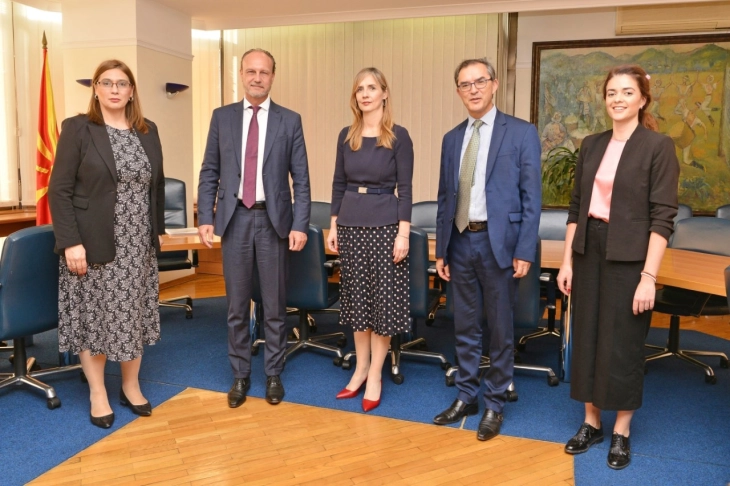Angelovska-Bezhoska meets with Baumgatner and Grandjouan: N. Macedonia’s macroeconomic stability successfully maintained

Skopje, 26 October 2022 (MIA) – As a small and open economy, the Macedonian economy is influenced by the pressures of the current global crisis. However, the macroeconomic stability and the stability of the financial sector have been maintained while the healthy banking sector is providing the necessary support for businesses and citizens. The National Bank is gradually normalizing the monetary policy, as a result of the stabilization of the inflation expectations and maintaining medium-term price stability.
This was one of the topics of discussion at Wednesday's meeting of National Bank Governor Anita Angelovska-Bezhoska with French Ambassador to North Macedonia, Cyrille Baumgatner, the new head of the Regional Economic Department of the French Embassy to Serbia, Pierre Granjouan and the new Deputy Head of the Economic Department of the French Embassy to Serbia, Céline Héricher.
The Governor pointed out that the increased geopolitical tensions at the beginning of the year led to pronounced upward pressures on inflation, but also pressures on the foreign exchange market caused by the rising energy prices and the economy’s high dependence on energy imports.
In these circumstances, Angelovska-Bezhoska said, the National Bank, as almost all central banks in the world, began gradually raising the interest rate, as well as undertaking targeted measures in order to encourage savings in domestic currency and financing renewable energy projects.
The National Bank stated that the interlocutors at the meeting concluded that the stability of the exchange rate has been successfully maintained, while the foreign exchange reserves are at pre-pandemic levels, providing support for the current strategy. Regarding the financial sector, its liquidity and capitalization were singled out as factors for its resilience and capacity to provide sufficient credit support. However, considering the existing risks, the need for careful further monitoring of this area was reiterated. The recent introduction of a countercyclical capital buffer was pointed out as an appropriate measure, through which the resistance of the banks to further shocks continues to be strengthened.
“The regional economic department of the French Embassy to Serbia covers the Western Balkan countries. The main mission of the Department is to monitor and analyze the financial and economic conditions of the region, to monitor the economic policies, foreign trade, public finance and the financial sector, but also to work on adapting and improving the economic relations between France and the countries of the region. The Department also coordinates bilateral relations with the countries and provides support for international development of businesses, especially by monitoring large projects,” said the National Bank. ad/nn/







